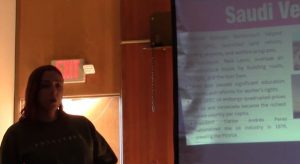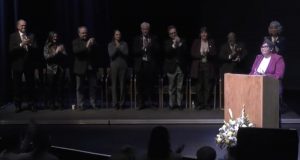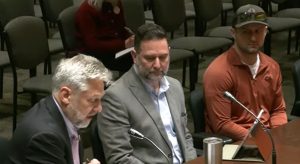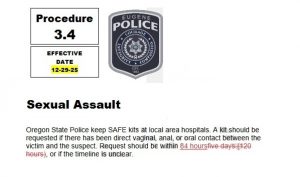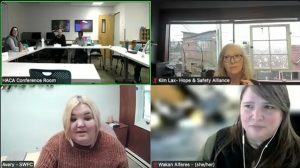Keep speaking out, even if fossil fuel corporations pay police to follow you
7 min read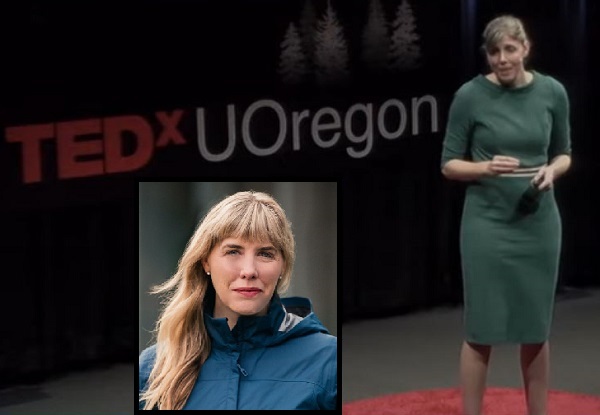
The Intercept reported Nov. 8: Years after community activists fought the Jordan Cove project, police continue to monitor their activities. For background on the story, we checked in with community organizer Doyle Canning.
Doyle Canning: Back in 2019, the fight to stop the Jordan Cove fracked gas pipeline was at a fever pitch. You know, the project had been named by the Trump administration as a key priority. We had very prominent members of Congress pushing for the project, and a global fossil fuel industry that was really gunning for this pipeline, and this LNG (liquefied natural gas) export terminal in Coos Bay as part of a global scheme to export fracked gas from the West Coast of North America.
[00:00:47] And there was a grassroots movement, really neighbors and landowners—people who lived directly in the path of this pipeline and lived in surrounding communities across Southern Oregon, all the way from the Klamath territories in the east, all the way to the coast. The pipeline would have crossed over 200 bodies of water, cut through really pristine areas of our national forest.
[00:01:16] This was a devastating and ecological disaster in the making, and it had been building for almost 15 years at that point and it had the support of the president. It was not looking good. But the community really never gave up and kept on organizing and kept on raising this issue in every possible forum: with the governor; with our Land Use Board of Appeals; and city council processes in the city of Coos Bay and all the communities along the way.
[00:01:53] And so in 2019, it came out that the private company, Pembina, a Canadian fossil fuel corporation, had actually directly funded the Coos Bay Sheriff’s office for a privatized surveillance operation of the opposition to Jordan Cove. And this opposition was ideologically diverse—economically, politically diverse—very conservative landowners, staunch Republicans, along with folks who had never been involved in any kind of social action before, along with global leaders in the climate movement.
[00:02:38] And the company paid the Coos Bay sheriff’s office directly for privatized surveillance operations really kind of criminalizing the protected activity of the communities in southern Oregon that were standing up against this fossil fuel company and trying to protect their lands, their livelihoods and our global climate.
[00:03:03] So it was shocking news at the time it came out, in The Guardian newspaper out of the UK, that this privatized security operation was underway. And I remember at that time Sen. Wyden came out and said, ‘This is wrong. We can’t have private companies paying law enforcement to spy on citizens who are exercising their First Amendment rights.’
[00:03:29] It was very tense. You know, it really looked like this pipeline project was going to go forward. The President of the United States was pushing for it. We had a multi-billion-dollar fossil fuel company pulling out all the stops. And they thought that they could buy off local permitting processes, that their lobbying and political spending and just plain bullying was going to get this pipeline built, but they had another think coming. There was a grassroots movement of Oregonians who were arm-in-arm saying, ‘Not this time,’ and ‘Stop this LNG pipeline disaster from destroying our communities, our watersheds, our livelihoods and future generations in terms of the climate impact.’
[00:04:19] This would have been the largest greenhouse gas emitting project in the state of Oregon by a mile and really be a global, globally significant link in the chain in terms of the fossil fuel energy economy at a time when we’ve got to be building those links in the chain of a clean energy and renewable energy economy.
[00:04:44] At that time, it was really, chilling, shocking, surprising but also evidence that the company was getting desperate—to try to spy on and intimidate members of the Coos Bay community and more broadly the community that was opposing this fossil fuel project. And eventually it was our communities that prevailed.
[00:05:05] John Q: Four years later, the Intercept reports, the monitoring and intimidation continues.
[00:05:12] Doyle Canning: Someone sent me the story in The Intercept that came out in the recent weeks about how the surveillance operation that had started ostensibly under the auspices of this Jordan Cove fusion surveillance operation had continued at least in Medford—amongst the local police department in Medford—and that it had continued beyond Jordan Cove and become an ongoing surveillance operation of people who are exercising their First Amendment-protected rights on all manner of topics: the Roe v. Wade decision reversal and the outcry that ensued; the murder of George Floyd and the outcry that ensued; topics related to the pandemic and response; topics related to addiction and mental health; and Measure 110.
[00:06:06] John Q: In September, The Lund Report shared email messages among Medford police and other city officials as they learned that a state health grant was being awarded to a group they’d been monitoring. They contacted the state to express concern, claiming widespread community opposition.
[00:06:22] Doyle Canning: I mean, we’re talking about, you know, the big topics of the day that are being discussed in the public square. And somehow this is under scrutiny and surveillance by the local police using the same kind of apparatus and protocol that was developed in this operation that was undertaken, again, at the behest of a fossil fuel company to monitor anti-pipeline protests and community organizing.
[00:06:50] And so it’s concerning. It’s evidence that, this is why we need to guard our civil liberties and our First Amendment freedoms so zealously, because once the door is open, it tends to stay open, right? This is evidence of that.
[00:07:07] And that’s why it’s so important to protect our freedoms, particularly our fundamental freedom of speech and to petition our government for redress of grievances. That is so fundamental. And when a fossil fuel company is allowed to come in and paid the Coos Bay Sheriff’s Office directly to monitor and police the community for exercising their right to oppose a fossil fuel project in their own community—we see the long shadow of that even years later.
[00:07:43] I think every Oregonian should be concerned when we find out that local police are actively monitoring the protected free speech activity of members of our community as if it were criminal. That is something that should concern all of us, particularly in an environment and a time when we have the leading presidential candidate for one party outright saying that under his administration, he would ‘root out’ the ‘vermin’ of his political opponents. And that kind of rhetoric is chilling and should concern all of us who, no matter our views, value the fundamental freedom of speech in the United States.
[00:08:40] John Q: With fossil fuels heating the planet, we’re now seeing dramatic change: rising sea levels, catastrophic floods, mega-wildfires. Yet our own intelligence services and police are aligned with the world’s richest corporations to suppress opposition.
[00:08:58] Doyle Canning: Just in the last few days, we’ve seen the confirmation that for the first time in our evolutionary history—since human beings have walked on earth—we’ve had a two degree rise in temperature. We’ve experienced that just in recent months, the hottest months ever recorded, and we see the catastrophic impact of what that means in terms of wildfire here in Oregon, in terms of a tropical cyclone on the West Coast in the Pacific, which is really unheard of. And, of course: fires, floods, rainstorms, and extreme events that threaten life and property all over the world.
[00:09:48] The Earth’s climate system is choking on fossil fuel pollution. And until we start to address that problem by really stopping the fossil fuel pollution—which is exactly what the activists in Southern Oregon were trying to do with stopping this pipeline—we’re going to continue to see the crisis get worse.
[00:10:07] And so my words of encouragement are: These years are crucial. We are at the turning point in terms of our global climate system. If we can turn this around and stabilize the situation, now is our moment to do that. And everything we do makes a difference.
[00:10:27] And so, I want to, of course, encourage everyone to stand up, speak out, be a part of the solution and don’t let news like this intimidate you or dampen your efforts to do what’s needed to save our climate.
[00:10:46] John Q: Doyle Canning encourages all Oregonians to keep speaking out against fossil fuels, and to exercise and protect our First Amendment rights. The next few years are critical.
Editor’s Note: Medford Police issued a statement Nov. 9 in response to the Intercept story which was also shared on their Facebook page. The Lund Report published a follow-up story Nov. 21 indicating that the Oregon Health Authority signed the contract for the Medford peer respite center, despite concerns expressed by Medford Police. And Sen. Ron Wyden on Nov. 20 requested documents describing yet another domestic surveillance program which provides information to law enforcement officials, “usually without warrants.”

